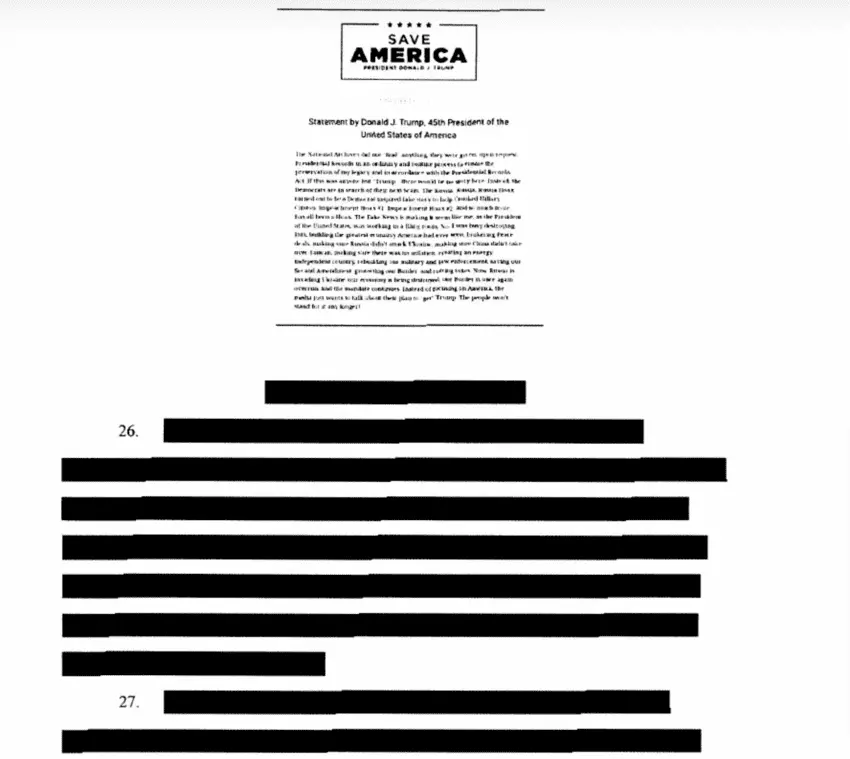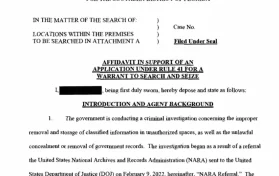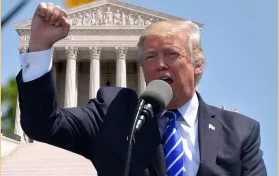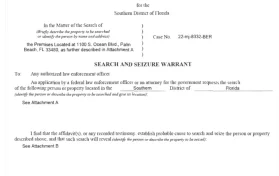
Last Thursday, the same magistrate who signed the warrant for an August search at President Donald Trump‘s personal home, Mar-a-Lago, ruled that portions of the affidavit provided to him should be at least partially redacted. Multiple media outlets had filed a motion for the affidavit to be unsealed, but the Justice Department said that there were dangerous ramifications should the document be released to the public in its entirety. On Thursday, August 25, the Department of Justice turned in its proposed redactions in to the magistrate.
Yesterday, the highly anticipated affidavit was published. So many were excited to see the document that the website where citizens could access the affidavit crashed. It remained down for the better part of an hour.
Once individuals were finally able to take a look at the redacted affidavit, which is heavily redacted, many sighed that the document left more questions and few answers. Some pages were completed blacked out, and of 38 pages, 20 were redacted.
Let’s begin with the amount of redactions present in the document. Most Americans expected this due to the Justice Department’s argument that offering too much information could harm the case. Information such as witness names were expected to be blacked out, but the amount of redactions show that more than simply witness names were redacted.
The Justice Department was required to file a justification for the redactions when they handed the document back to magistrate Judge Bruce Reinhart. One justification for the redactions spoke to the idea that the “premature disclosure” may hinder the investigation in the following manner: “by allowing criminal parties an opportunity to flee, destroy evidence, change patterns of behavior, and notify criminal confederates.”
Second, the length of the affidavit is remarkable. One professor at the Ave Maria School of Law told Fox News Digital that while the length is not “unprecedented,” it is still out of the norm for a federal affidavit. Professor Mark W. Smith said, “The more explaining an attorney must do in writing often translates into a longer legal document and frequently signifies a weaker legal position.” Smith went on to compare the affidavit to “an educational tool” rather than a typical legal document.
Third, the affidavit did mention 187 documents previously turned over by President Trump to the National Archives prior to the raid. The affidavit mentioned the initial return of fifteen boxes of materials in January 2022, and it specifically said that the government did not begin going through the materials until May. It’s important to point out here that multiple political commentators are mentioning that many personal documents, such as handwritten notes and newspaper clippings, were mixed in with the allegedly classified documents. The affidavit also specifically calls out Kash Patel, who worked with national security as a part of the Trump Administration.
The affidavit mentions a quote from Patel utilized in a Breitbart article in which Patel says that Trump had already declassified all the documents before leaving the White House.
Patel specifically said: “It’s information that Trump felt spoke to matters regarding everything from Russiagate to the Ukraine impeachment fiasco to major national security matters of great public importance — anything the president felt the American people had a right to know is in there and more.”
This claim gives some credibility to social media rumors that the alleged classified documents may contain information that certain members of government don’t want to be made public. However, without knowing what is in the government’s case to this point, one cannot know for certain.
Both Kash Patel and Trump’s legal team have said that the president had the right to declassify the documents, and that he had done so prior to the end of his term.
Next, the Justice Department wrote in the affidavit that they had probable cause to believe there was obstruction going on. The probable cause section was rather lengthy, and it did mention that in June, the government had asked for Trump to further secure the area where the documents were stored. However, they did not feel the measure was enough.
Finally, President Trump reacted by describing the redacted affidavit as including nothing about Trump having nuclear secrets. He also called the investigation “public relations subterfuge.”





